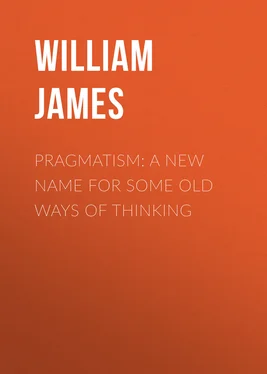William James - Pragmatism - A New Name for Some Old Ways of Thinking
Здесь есть возможность читать онлайн «William James - Pragmatism - A New Name for Some Old Ways of Thinking» — ознакомительный отрывок электронной книги совершенно бесплатно, а после прочтения отрывка купить полную версию. В некоторых случаях можно слушать аудио, скачать через торрент в формате fb2 и присутствует краткое содержание. Жанр: foreign_antique, Философия, foreign_edu, на английском языке. Описание произведения, (предисловие) а так же отзывы посетителей доступны на портале библиотеки ЛибКат.
- Название:Pragmatism: A New Name for Some Old Ways of Thinking
- Автор:
- Жанр:
- Год:неизвестен
- ISBN:нет данных
- Рейтинг книги:5 / 5. Голосов: 1
-
Избранное:Добавить в избранное
- Отзывы:
-
Ваша оценка:
- 100
- 1
- 2
- 3
- 4
- 5
Pragmatism: A New Name for Some Old Ways of Thinking: краткое содержание, описание и аннотация
Предлагаем к чтению аннотацию, описание, краткое содержание или предисловие (зависит от того, что написал сам автор книги «Pragmatism: A New Name for Some Old Ways of Thinking»). Если вы не нашли необходимую информацию о книге — напишите в комментариях, мы постараемся отыскать её.
Pragmatism: A New Name for Some Old Ways of Thinking — читать онлайн ознакомительный отрывок
Ниже представлен текст книги, разбитый по страницам. Система сохранения места последней прочитанной страницы, позволяет с удобством читать онлайн бесплатно книгу «Pragmatism: A New Name for Some Old Ways of Thinking», без необходимости каждый раз заново искать на чём Вы остановились. Поставьте закладку, и сможете в любой момент перейти на страницу, на которой закончили чтение.
Интервал:
Закладка:
This new idea is then adopted as the true one. It preserves the older stock of truths with a minimum of modification, stretching them just enough to make them admit the novelty, but conceiving that in ways as familiar as the case leaves possible. An outree explanation, violating all our preconceptions, would never pass for a true account of a novelty. We should scratch round industriously till we found something less excentric. The most violent revolutions in an individual's beliefs leave most of his old order standing. Time and space, cause and effect, nature and history, and one's own biography remain untouched. New truth is always a go-between, a smoother-over of transitions. It marries old opinion to new fact so as ever to show a minimum of jolt, a maximum of continuity. We hold a theory true just in proportion to its success in solving this 'problem of maxima and minima.' But success in solving this problem is eminently a matter of approximation. We say this theory solves it on the whole more satisfactorily than that theory; but that means more satisfactorily to ourselves, and individuals will emphasize their points of satisfaction differently. To a certain degree, therefore, everything here is plastic.
The point I now urge you to observe particularly is the part played by the older truths. Failure to take account of it is the source of much of the unjust criticism leveled against pragmatism. Their influence is absolutely controlling. Loyalty to them is the first principle—in most cases it is the only principle; for by far the most usual way of handling phenomena so novel that they would make for a serious rearrangement of our preconceptions is to ignore them altogether, or to abuse those who bear witness for them.
You doubtless wish examples of this process of truth's growth, and the only trouble is their superabundance. The simplest case of new truth is of course the mere numerical addition of new kinds of facts, or of new single facts of old kinds, to our experience—an addition that involves no alteration in the old beliefs. Day follows day, and its contents are simply added. The new contents themselves are not true, they simply COME and ARE. Truth is what we say about them, and when we say that they have come, truth is satisfied by the plain additive formula.
But often the day's contents oblige a rearrangement. If I should now utter piercing shrieks and act like a maniac on this platform, it would make many of you revise your ideas as to the probable worth of my philosophy. 'Radium' came the other day as part of the day's content, and seemed for a moment to contradict our ideas of the whole order of nature, that order having come to be identified with what is called the conservation of energy. The mere sight of radium paying heat away indefinitely out of its own pocket seemed to violate that conservation. What to think? If the radiations from it were nothing but an escape of unsuspected 'potential' energy, pre-existent inside of the atoms, the principle of conservation would be saved. The discovery of 'helium' as the radiation's outcome, opened a way to this belief. So Ramsay's view is generally held to be true, because, altho it extends our old ideas of energy, it causes a minimum of alteration in their nature.
I need not multiply instances. A new opinion counts as 'true' just in proportion as it gratifies the individual's desire to assimilate the novel in his experience to his beliefs in stock. It must both lean on old truth and grasp new fact; and its success (as I said a moment ago) in doing this, is a matter for the individual's appreciation. When old truth grows, then, by new truth's addition, it is for subjective reasons. We are in the process and obey the reasons. That new idea is truest which performs most felicitously its function of satisfying our double urgency. It makes itself true, gets itself classed as true, by the way it works; grafting itself then upon the ancient body of truth, which thus grows much as a tree grows by the activity of a new layer of cambium.
Now Dewey and Schiller proceed to generalize this observation and to apply it to the most ancient parts of truth. They also once were plastic. They also were called true for human reasons. They also mediated between still earlier truths and what in those days were novel observations. Purely objective truth, truth in whose establishment the function of giving human satisfaction in marrying previous parts of experience with newer parts played no role whatever, is nowhere to be found. The reasons why we call things true is the reason why they ARE true, for 'to be true' MEANS only to perform this marriage-function.
The trail of the human serpent is thus over everything. Truth independent; truth that we FIND merely; truth no longer malleable to human need; truth incorrigible, in a word; such truth exists indeed superabundantly—or is supposed to exist by rationalistically minded thinkers; but then it means only the dead heart of the living tree, and its being there means only that truth also has its paleontology and its 'prescription,' and may grow stiff with years of veteran service and petrified in men's regard by sheer antiquity. But how plastic even the oldest truths nevertheless really are has been vividly shown in our day by the transformation of logical and mathematical ideas, a transformation which seems even to be invading physics. The ancient formulas are reinterpreted as special expressions of much wider principles, principles that our ancestors never got a glimpse of in their present shape and formulation.
Mr. Schiller still gives to all this view of truth the name of 'Humanism,' but, for this doctrine too, the name of pragmatism seems fairly to be in the ascendant, so I will treat it under the name of pragmatism in these lectures.
Such then would be the scope of pragmatism—first, a method; and second, a genetic theory of what is meant by truth. And these two things must be our future topics.
What I have said of the theory of truth will, I am sure, have appeared obscure and unsatisfactory to most of you by reason of us brevity. I shall make amends for that hereafter. In a lecture on 'common sense' I shall try to show what I mean by truths grown petrified by antiquity. In another lecture I shall expatiate on the idea that our thoughts become true in proportion as they successfully exert their go-between function. In a third I shall show how hard it is to discriminate subjective from objective factors in Truth's development. You may not follow me wholly in these lectures; and if you do, you may not wholly agree with me. But you will, I know, regard me at least as serious, and treat my effort with respectful consideration.
You will probably be surprised to learn, then, that Messrs. Schiller's and Dewey's theories have suffered a hailstorm of contempt and ridicule. All rationalism has risen against them. In influential quarters Mr. Schiller, in particular, has been treated like an impudent schoolboy who deserves a spanking. I should not mention this, but for the fact that it throws so much sidelight upon that rationalistic temper to which I have opposed the temper of pragmatism. Pragmatism is uncomfortable away from facts. Rationalism is comfortable only in the presence of abstractions. This pragmatist talk about truths in the plural, about their utility and satisfactoriness, about the success with which they 'work,' etc., suggests to the typical intellectualist mind a sort of coarse lame second-rate makeshift article of truth. Such truths are not real truth. Such tests are merely subjective. As against this, objective truth must be something non-utilitarian, haughty, refined, remote, august, exalted. It must be an absolute correspondence of our thoughts with an equally absolute reality. It must be what we OUGHT to think, unconditionally. The conditioned ways in which we DO think are so much irrelevance and matter for psychology. Down with psychology, up with logic, in all this question!
Читать дальшеИнтервал:
Закладка:
Похожие книги на «Pragmatism: A New Name for Some Old Ways of Thinking»
Представляем Вашему вниманию похожие книги на «Pragmatism: A New Name for Some Old Ways of Thinking» списком для выбора. Мы отобрали схожую по названию и смыслу литературу в надежде предоставить читателям больше вариантов отыскать новые, интересные, ещё непрочитанные произведения.
Обсуждение, отзывы о книге «Pragmatism: A New Name for Some Old Ways of Thinking» и просто собственные мнения читателей. Оставьте ваши комментарии, напишите, что Вы думаете о произведении, его смысле или главных героях. Укажите что конкретно понравилось, а что нет, и почему Вы так считаете.












